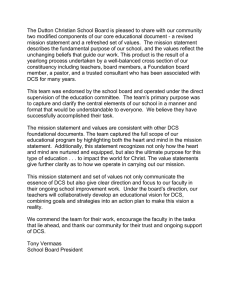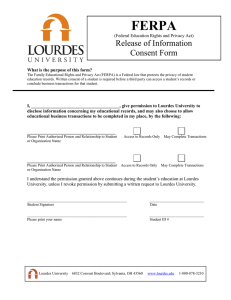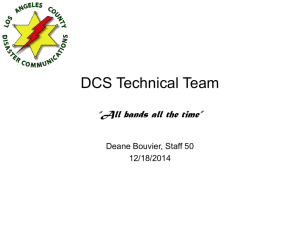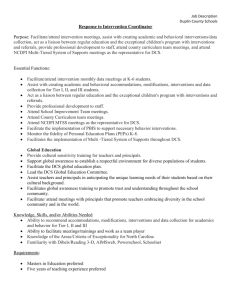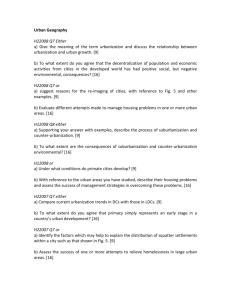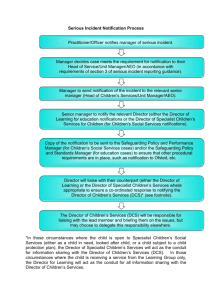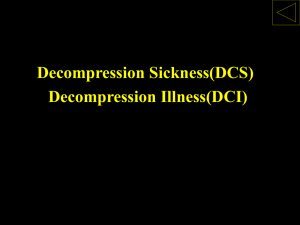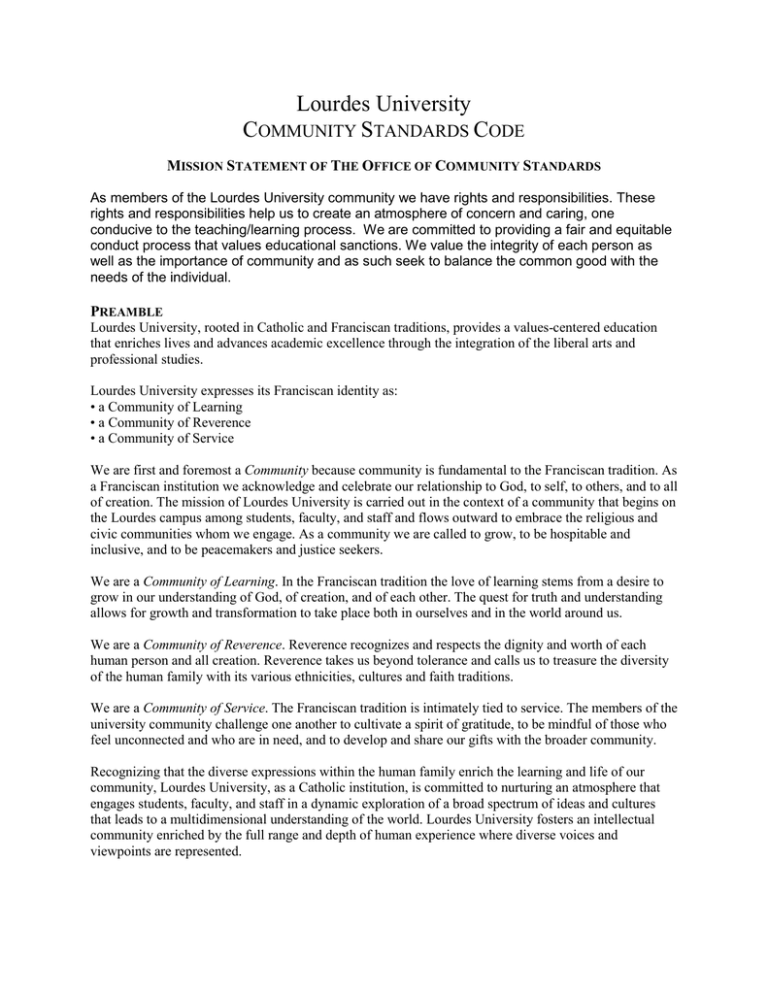
Lourdes University
COMMUNITY STANDARDS CODE
MISSION STATEMENT OF THE OFFICE OF COMMUNITY STANDARDS
As members of the Lourdes University community we have rights and responsibilities. These
rights and responsibilities help us to create an atmosphere of concern and caring, one
conducive to the teaching/learning process. We are committed to providing a fair and equitable
conduct process that values educational sanctions. We value the integrity of each person as
well as the importance of community and as such seek to balance the common good with the
needs of the individual.
PREAMBLE
Lourdes University, rooted in Catholic and Franciscan traditions, provides a values-centered education
that enriches lives and advances academic excellence through the integration of the liberal arts and
professional studies.
Lourdes University expresses its Franciscan identity as:
• a Community of Learning
• a Community of Reverence
• a Community of Service
We are first and foremost a Community because community is fundamental to the Franciscan tradition. As
a Franciscan institution we acknowledge and celebrate our relationship to God, to self, to others, and to all
of creation. The mission of Lourdes University is carried out in the context of a community that begins on
the Lourdes campus among students, faculty, and staff and flows outward to embrace the religious and
civic communities whom we engage. As a community we are called to grow, to be hospitable and
inclusive, and to be peacemakers and justice seekers.
We are a Community of Learning. In the Franciscan tradition the love of learning stems from a desire to
grow in our understanding of God, of creation, and of each other. The quest for truth and understanding
allows for growth and transformation to take place both in ourselves and in the world around us.
We are a Community of Reverence. Reverence recognizes and respects the dignity and worth of each
human person and all creation. Reverence takes us beyond tolerance and calls us to treasure the diversity
of the human family with its various ethnicities, cultures and faith traditions.
We are a Community of Service. The Franciscan tradition is intimately tied to service. The members of the
university community challenge one another to cultivate a spirit of gratitude, to be mindful of those who
feel unconnected and who are in need, and to develop and share our gifts with the broader community.
Recognizing that the diverse expressions within the human family enrich the learning and life of our
community, Lourdes University, as a Catholic institution, is committed to nurturing an atmosphere that
engages students, faculty, and staff in a dynamic exploration of a broad spectrum of ideas and cultures
that leads to a multidimensional understanding of the world. Lourdes University fosters an intellectual
community enriched by the full range and depth of human experience where diverse voices and
viewpoints are represented.
Lourdes University reflects its Franciscan values of community, learning, reverence, and service through
initiatives that include professional, pedagogical, and student development, as well as community events
that actively promote and support a diverse population.
Student Rights and Responsibilities
All members of the academic community have rights and responsibilities. These help create an
atmosphere of concern and caring, one conducive to the teaching/learning process.
Student rights include the following:
1. Freedom from threats.
2. Freedom from acts of violence.
3. Freedom from unfair or obscene treatment from others.
4. Freedom from interference from others in an unreasonable and unauthorized manner while in class,
activities and University events.
5. Freedom from theft and willful destruction of personal property.
6. Right to study and learn in an atmosphere of academic freedom.
7. Right to fundamental fairness in University disciplinary action.
8. Right to be governed by justifiable academic regulations.
9. Right to be informed of the regulations for academic and social conduct, and graduation requirements
of the University.
10. Right to petition for redress of grievances, academic and non‑academic.
Student responsibilities include the following:
1. To respect the rights and property of others.
2. To be fully acquainted and comply with the published rules and regulations of the University.
3. To comply with all local, state, and federal laws.
4. To recognize that student actions reflect upon the individuals involved as well as upon the entire
University community.
5. To recognize the University’s obligation to provide an environment conducive for learning and
academic inquiry.
6. To adhere to the academic requirements determined by individual instructors.
ARTICLE I: DEFINITIONS
1. The term University means Lourdes University.
2. The term “student” includes all persons taking courses at the University, either full-time or part-time, pursuing
undergraduate, graduate, or professional studies. Persons who withdraw after allegedly violating the Community
Standards Code, who are not officially enrolled for a particular term but who have a continuing relationship with the
University or who have been notified of their acceptance for admission are considered “students” as are persons who
are living in University residence halls, although not enrolled in this institution. For the purposes of administering
Community Standards the term “student” shall also refer to a student organization recognized by the Student
Activities Office.
3. The term “faculty member” means any person hired by the University to conduct classroom or teaching activities
or who is otherwise considered by the University to be a member of its faculty.
4. The term “University official” includes any person employed by the University, performing assigned
administrative or professional responsibilities.
5. The term “member of the University community” includes any person who is a student, faculty member,
University official or any other person employed by the University. A person’s status in a particular situation shall
be determined by the Director of Community Standards (DCS).
6. The term “University premises” includes all land, buildings, facilities, and other property in the possession of or
owned, used, or controlled by the University (including adjacent streets and sidewalks) and University sponsored
activities on or off campus. This term also refers to any land, building, facility or other property that the University
is leasing or renting for a University function.
7. The term “organization” means an organization that is acknowledged, or recognized, by the Student Activities
Office and Lourdes University. A registered student organization has an updated roster, at least 3 student members,
a completed constitution, and an advisor and is expected to uphold the Community Standards Code of Conduct
8. The term “Community Standards Board” means any persons authorized by the DCS to conduct a hearing to
determine whether a student has violated University policy and to recommend sanctions, subject to the DCS
approval, that may be assigned when it is determined that a violation has been committed. Generally, a Community
Standards Board has three members, one of which is a designated chairperson: one faculty member, one staff
member, and one student member; however, there may be extreme circumstances, as determined by the DCS, in
which a Community Standards Board make-up is altered because it is not reasonable to hold the hearing in a timely
fashion unless the make-up is changed.
9. The DCS may authorize a University official to fill the DCS role in extraordinary situations. This University
official designated to fill the DCS role may have some or all of the powers/roles assigned to the DCS for the cases in
question.
10. The term “Appellate Board” means any person or persons authorized by the Vice President for Student Life to
consider an appeal from a Community Standards Board’s determination as to whether a student has violated the
Community Standards Code or from the sanctions assigned by the DCS.
11. The term “shall” is used in the imperative sense.
12. The term “may” is used in the permissive sense.
13. The Director of Community Standards (DCS), currently Andy Ham, is that person designated by the Vice
President for Student Life to be responsible for the administration of the Community Standards Code. The DCS can
be reached at 419 824-3873 or tmatthews@lourdes.edu.
14. The term “policy” means the written regulations of the University as found in, but not limited to, the Community
Standards Code of Conduct, Student Handbook, Residence Life Handbook, the University web pages and computer
use policy, and Graduate/Undergraduate Catalogs.
15. The term “Complainant” means any member of the Lourdes community who submits an incident report alleging
that a student violated this Community Standards Code. If a student believes they have been a victim of another
student’s misconduct but are not the person who filed an incident report for that incident they shall have the same
rights under the Community Standards Code as a Complainant who did file an incident report.
16. The term “Accused Student” means any student accused of violating this Community Standards Code.
17. The term “Guest” refers to a person not considered to be a member of the University community but who is on
University premises accompanying a member of the University community.
18. The term “Student Impact Statement” refers to information, presented either orally or in written form, supplied
by any member of the University community concerning the impact an incident has had upon their ability to pursue
their education related activities at Lourdes University.
19. The term “Incident Report Form” refers to the document which is completed when a potential violation of
Community Standards has occurred. This form may be completed by any member of the Lourdes University
community.
ARTICLE II: COMMUNITY STANDARDS CODE AUTHORITY
1. The DCS shall determine the composition of Community Standards Boards and determine which Community
Standards Board shall be authorized to hear each matter. The VP of Student Life shall determine the composition of
any Appellate Boards and which Appellate Board shall be authorized to hear each matter.
2. The DCS in partnership with the Title IX Coordinator shall develop policies for the administration of the student
conduct system and procedural rules for the conduct of Community Standards Board Hearings that are consistent
with provisions of the Community Standards Code.
3. Decisions made by a Community Standards Board and/or DCS shall be final, pending the normal appeal process.
ARTICLE III: PROSCRIBED CONDUCT
A. Jurisdiction of the University Community Standards Code
Jurisdiction shall apply to conduct that occurs on University premises, at University sponsored activities, and to offcampus conduct that adversely affects the University Community and/or the pursuit of its objectives.
Each student shall be responsible for their own conduct from notification of acceptance to the University through the
actual awarding of a degree, even though conduct may occur before classes begin or after classes end, as well as
during the academic year and during periods between terms of actual enrollment (and even if their conduct is not
discovered until after a degree is awarded). The Community Standards Code shall apply to a student’s conduct even
if the student withdraws from school while a disciplinary matter is pending. The DCS shall decide whether the
Community Standards Code shall be applied to conduct occurring off campus, on a case by case basis, in his/her
sole discretion.
B. Code of Conduct
Any student found to have committed or to have attempted to commit the following misconduct is subject to the
disciplinary sanctions outlined in Article IV:
1. Acts of dishonesty, including but not limited to the following:
a. Cheating, plagiarism, or other forms of academic dishonesty.
b. Furnishing false information to any University official, faculty member, or office.
c. Forgery, alteration, or misuse of any University document, record, or instrument of identification.
2. Disruption or obstruction of teaching, research, administration, disciplinary proceedings, normal University
operations, athletic events, other University activities, including its public service functions on or off campus, or of
other authorized non-University activities when the conduct occurs on University premises.
3. Physical abuse, verbal abuse, threats, intimidation, harassment, coercion, and/or other conduct which threatens or
endangers the health or safety of any person.
4. Any sexual misconduct that occurs without the consent of the victim, or that occurs when the victim is unable to
give consent.
a. Sexual misconduct involves:
i. Sexual harassment- Unwelcome sexual advances, requests for sexual favors, or other verbal or physical
conduct of a sexual nature that expressly or implicitly imposes conditions upon, threatens, interferes with,
or creates a hostile environment, and the conduct is sufficiently serious to limit or deny someone’s ability
to participate in or benefit from the school’s educational program and/oractivities.
Example of sexual harassment-a professor insists that a student have sex with him/her in exchange
for a good grade.
ii. Sexual violence-refers to physical sexual acts perpetrated against a person’s will or where a person is
incapable of giving consent. A number of different acts fall into the category of sexual violence including
rape, sexual assault, sexual battery, sexual abuse, and sexual coercion.
b. The term “consent” as it applies to sexual misconduct refers to all parties engaged in sexual activity
giving permission to proceed with the activity in a way that a reasonable person would consider the words
or actions of all parties to have manifested a mutually understandable agreement between them to do the
same thing, the same way, at the same time, with the same parties.
i. Consent cannot be obtained through fraud, intimidation, or force (actual or implied);
ii. Consent cannot be given by a child to an adult;
iii. A person who is physically incapacitated cannot give consent even if they verbally agree to
sexual activity;
iv. A person who is incapacitated due to drug or alcohol consumption, or who is unconscious,
unaware, or otherwise physically helpless cannot give consent;
v. It is up to the initiator of sexual conduct to determine if the other parties are incapacitated using
what a reasonable person would consider incapacitation;
vi. A person with a mental disability cannot give consent to sexual activity if they cannot
appreciate the fact, nature, or extent of the sexual situation in which they find themselves.
c. Additional clarifying rules of consent
i. A person who is the object of sexual aggression need not physically or otherwise resist a sexual
aggressor in order for sexual misconduct to have occurred.
ii. Silence, previous sexual relationships, and/or current relationship with the respondent do not
constitute consent.
iii. Consent cannot be implied based upon the way a person is dressed or inferred from the
purchase of meals, alcohol, or gifts.
iv. Consent to sexual activity can be withdrawn at any time, as long as the withdrawal is
communicated clearly, and all sexual activity must immediately cease.
v. Consent has an expiration date. Just because a party gives consent once, it does not mean that
consent is given for all future activity.
5. Attempted or actual theft of and/or damage to property of the University or property of a member of the
University community or other personal or public property, on or off campus.
6. Hazing, defined as an act which endangers the mental or physical health or safety of a student, or which destroys
or removes public or private property, for the purpose of initiation, admission into, affiliation with, or as a condition
for continued membership in, a group or organization. The express or implied consent of the victim will not be a
defense. Apathy or acquiescence in the presence of hazing are not neutral acts; they are violations of this rule.
7. Failure to comply with a directive of a University official or law enforcement officers acting in performance of
their duties and/or failure to identify oneself to these persons when requested to do so.
8. Unauthorized possession, duplication or use of keys or student I.D. cards to any University premises or
unauthorized entry to or use of University premises.
9. Violation of any University policy, rule, or regulation published in hard copy or available electronically on the
University website.
10. Violation of any federal, state or local law.
11. The use of non-prescribed controlled substances, possession and trafficking (manufacturing, dispensing, or
selling) of controlled substances,
a. Improper use of prescription medications
b. Possession of drug related paraphernalia (i.e., bongs, bowls, pipes, and other common containers) is not
permitted on the Lourdes University campus.
12. Unlawful use, possession, manufacturing, or distribution of alcoholic beverages; or use/misuse/abuse of alcohol
related to disorderly conduct and/or any associated disruption on the University premises. Alcoholic beverages may
not, in any circumstance, be used by, possessed by or distributed to any person under twenty-one (21) years of age.
a. Lourdes University reserves the right to notify parents or guardians of students younger than 21 years of
age who violate the University’s drug or alcohol policies. Parents may also be notified if a student requires
medical attention as a result of any violation.
13. Possession of firearms, explosives, other weapons, or dangerous chemicals on University premises.
14. Participating in an on-campus or off-campus demonstration, riot or activity that disrupts the normal operations of
the University and/or infringes on the rights of other members of the University community; leading or inciting
others to disrupt scheduled and/or normal activities within any campus building or area.
15. Obstruction of the free flow of pedestrian or vehicular traffic on University premises or at University sponsored
or supervised functions.
16. Conduct that is disorderly, lewd, or indecent; breach of peace; or aiding, abetting, or procuring another person to
breach the peace on University premises or at functions sponsored by, or participated in by, the University or
members of the academic community. Disorderly Conduct includes, but is not limited to: Any unauthorized use of
electronic or other devices to make an audio or video record of any person while on University premises without
his/her prior knowledge, or without his/her effective consent when such a recording is likely to cause injury or
distress. This includes, but is not limited to, surreptitiously taking pictures of another person in a gym, locker room,
or restroom.
17. Theft or other abuse of computer facilities and resources, including but not limited to:
a. Unauthorized entry into a file, to use, read, or change the contents, or for any other purpose.
b. Unauthorized transfer of a file.
c. Use of another individual’s identification and/or password.
d. Use of computing facilities and resources to interfere with the work of another student, faculty member
or University official.
e. Use of computing facilities and resources to send obscene or abusive messages.
f. Use of computing facilities and resources to interfere with normal operation of the University computing
system.
g. Use of computing facilities and resources in violation of copyright laws.
h. Any violation of the University Computer Use Policy.
18. Abuse of the Student Conduct System, including but not limited to:
a. Failure to obey the notice from a Community Standards Board or University official to appear for a
meeting or hearing as part of the Student Conduct System.
b. Falsification, distortion, or misrepresentation of information before a Community Standards Board.
c. Disruption or interference with the orderly conduct of a Community Standards Board proceeding.
d. Institution of a student conduct code proceeding in bad faith.
e. Attempting to discourage an individual’s proper participation in, or use of, the student conduct system.
f. Attempting to influence the impartiality of a member of a Community Standards Board prior to, and/or
during the course of, the Community Standards Board proceeding.
g. Harassment (verbal or physical) and/or intimidation of a member of a Community Standards Board prior
to, during, and/or after a student conduct code proceeding.
h. Failure to comply with the sanction(s) imposed under the Community Standards Code.
i. Influencing or attempting to influence another person to commit an abuse of the Student Conduct System.
19. Students are required to engage in responsible social conduct that reflects credit upon the University.
20. Members of the University community are responsible for the actions of their guests on University premises
even if the relevant conduct occurs off campus. Members of the University community whose guests are in violation
of a University policy are considered to be in violation of that same policy and may be held responsible for their
guest’s actions.
21. Gambling.
22. Smoking anywhere on University property including, but not limited to buildings, parking lots, vehicles, outdoor
areas, cloister walks, entrance and exit ways, etc. is not permitted except for the two designated smoking areas at
Lourdes Commons (the cement picnic table located behind Rosaria Hall and the cement picnic table between
Justinian and Bonaventure Halls). Smoking of any kind is explicitly prohibited inside the Lourdes Commons
residence halls and any other campus buildings. The smoking ban also extends beyond the 89 acre campus to
include adjacent properties (Franciscan Academy of Lourdes University, The Den, Mission & Ministry house, the
path between Lourdes Commons and Convent Blvd) and includes Lourdes owned or operated vehicles. This
smoking ban does not apply to public rights-of-way (sidewalks, streets) on the perimeter of the campus.
“Smoking,” as used in this policy, means smoking any substance including, but not limited to, tobacco, cloves, or
marijuana. The use of smoke producing products including cigarettes, cigars, pipes, electronic cigarettes, etc. is also
prohibited.
23. Any other action deemed contrary to the stated mission goals, policies and procedures of the University.
C. Violation of Law and University Discipline
1. University disciplinary proceedings may be instituted against a student charged with conduct that potentially
violates both the criminal law and this Community Standards Code (that is, if both possible violations result from
the same factual situation) without regard to the pending civil or criminal litigation in court or criminal arrest and
prosecution. Proceedings under this Community Standards Code may be carried out prior to, simultaneously with, or
following civil or criminal proceedings off campus at the discretion of DCS. Determinations made or sanctions
imposed under this Community Standards Code shall not be subject to change because criminal charges arising out
of the same facts giving rise to violation of University rules were dismissed, reduced, or resolved in favor of or
against the criminal law defendant.
2. When a student is charged by federal, state, or local authorities with a violation of law, the University will not
request or agree to special consideration for that individual because of his or her status as a student. If the alleged
offense is also being processed under the Community Standards Code, the University may advise off-campus
authorities of the existence of the Community Standards Code and of how such matters are typically handled within
the University community. The University will attempt to cooperate with law enforcement and other agencies in the
enforcement of criminal law on campus and in the conditions imposed by criminal courts for the rehabilitation of
student violators (provided that the conditions do not conflict with campus rules or sanctions). Individual students
and other members of the University community, acting in their personal capacities, remain free to interact with
governmental representatives as they deem appropriate.
ARTICLE IV: COMMUNITY STANDARDS CODE PROCEDURES
A. Charges and Community Standards Board Hearings
1. Any member of the University community may file an incident report against a student for violations of
University policy. An Incident Report Form shall be prepared and directed to the DCS. This online form can be
found on the Lourdes University website at: www.lourdes.edu/communitystandards. When an online Incident
Report is submitted it is sent directly to the email account of the DCS. The Incident Report Form is also available in
hard copy at the Welcome Center. The DCS may choose to accept incident reports submitted in formats other than
the official form depending on individual circumstances and based upon his or her sole discretion. Any Incident
Report should be submitted as soon as possible after the potential violation occurs, preferably within 48 hours. There
is no deadline for which to file an Incident Report although the longer the complainant waits the more difficult it
may be to investigate the incident.
2. The DCS will forward to the Title IX Coordinator any incident reports that allege or relate to gender-based
discrimination, harassment, or sexual misconduct. Please refer to the Lourdes University website for procedures
governing Title IX incidents and investigations. The webpage for Title IX can be found at:
http://www.lourdes.edu/Home/CampusLife/TitleIX.aspx.
3. If the incident report does not allege a Title IX issue, the DCS will present all charges to the accused student in
written form.
4. If the incident report does not allege a Title IX issue, the DCS may conduct an investigation to determine if the
charges have merit and/or if they can be disposed of administratively by mutual consent of the parties involved on a
basis acceptable to the DCS with sanctions acceptable to the DCS Such disposition shall be final and there shall be
no subsequent proceedings.
5. If the charges are not admitted and/or cannot be disposed of by mutual consent, the Accused Student has the right
to choose to
a. have a Community Standards Board hear their case and make a decision, based upon gathered
information, regarding whether a violation has occurred and deliver sanction recommendations to the DCS.
Or
b. have the DCS make a determination regarding whether a violation has occurred based upon gathered
information and determine sanctions.
6. If the Accused Student chooses a Community Standards Board hearing a time shall be set for the hearing not less
than one nor more than fifteen calendar days after the Accused Student has been notified of the charges. Maximum
time limits for scheduling of Community Standards Board Hearings may be extended at the discretion of the DCS.
7. Community Standards Board Hearings shall be conducted by a Community Standards Board according to the
following guidelines subject to necessary procedural changes as determined by the DCS.
a. Community Standards Board Hearings normally shall be conducted in private.
b. The Complainant and the Accused Student have the right to be assisted by an advisor they choose. The
advisor must be a member of the University community and may not be an attorney providing legal
representation to the student. The Complainant and/or the Accused Student is responsible for presenting his
or her own information, and therefore, advisors are not permitted to speak or to participate directly in any
Community Standards Board Hearing before a Community Standards Board. A student should select as an
advisor a person whose schedule allows attendance at the scheduled date and time for the Community
Standards Board Hearing because delays will not normally be allowed due to the scheduling conflicts of an
advisor. Lourdes is not responsible for the compensation of any Community Standards Board hearing
advisors.
c. The Complainant, Accused Student and their advisors, if any, shall be allowed to attend the entire portion
of the Community Standards Board Hearing at which information is received (excluding deliberations).
Admission of any other person to the Community Standards Board Hearing shall be at the discretion of the
Community Standards Board Chairperson and/or the DCS.
d. In Community Standards Board Hearings involving more than one Accused Student, the DCS, in his or
her discretion, may permit the Community Standards Board Hearings concerning each student to be
conducted either separately or jointly.
e. The Complainant, the Accused Student and the Community Standards Board may arrange for witnesses
to present pertinent information to the Community Standards Board. The University will try to arrange the
attendance of possible witnesses who are members of the University community, if reasonably possible,
and who are identified by the Complainant and/or Accused Student at least two weekdays prior to the
Community Standards Board Hearing. Witnesses will provide information to and answer questions from the
Community Standards Board. Questions may be suggested by the Accused Student and/or Complainant to
be answered by each other or by other witnesses. This will be conducted by the Community Standards
Board with such questions directed to the chairperson, rather than to the witness directly. This method is
used to preserve the educational tone of the hearing and to avoid creation of an adversarial environment.
Questions of whether potential information will be received shall be resolved in the discretion of the
chairperson of the Community Standards Board.
f. Pertinent records, exhibits, and written statements (including Student Impact Statements) may be
accepted as information for consideration by a Community Standards Board at the discretion of the
chairperson.
g. All procedural questions are subject to the final decision of the DCS.
h. After the portion of the Community Standards Board Hearing concludes in which all pertinent
information has been received, the Community Standards Board shall determine by majority vote whether
the Accused Student has violated each section of the Community Standards Code which the student is
charged with violating.
i. The Community Standards Board’s determination shall be made on the basis of whether it is more likely
than not that the Accused Student violated the Community Standards Code.
j. If the Community Standards Board determines a violation has been committed, a recommendation
concerning sanctions will be made to the DCS subject to his/her approval.
k. Formal rules of process, procedure, and/or technical rules of evidence, such as are applied in criminal or
civil court, are not used in Community Standards Code proceedings.
8. There shall be a single verbatim record, such as an audio recording, of all Community Standards Board Hearings
before a Community Standards Board (not including deliberations). Deliberations shall not be recorded. The record
shall be the property of the University.
9. If an Accused Student, with notice, does not appear before a Community Standards Board Hearing, the
information in support of the charges may be presented, considered, and a determination of responsibility made even
if the Accused Student is not present.
10. The Community Standards Board may accommodate concerns for the personal safety, well-being, and/or fears
of confrontation of the Complainant, Accused Student, and/or other witness during the hearing by providing separate
facilities, by using a visual screen, and/or by permitting participation by telephone, videophone, closed circuit
television, video conferencing, videotape, audio tape, written statement, or other means, where and as determined in
the sole judgment of DCS to be appropriate.
11. If the Accused student is not an enrolled student at the time of the alleged incident, s/he will be provided with all
charges in written form and have the opportunity to respond. The DCS may conduct an investigation to determine if
the charges have merit and/or if they can be disposed of administratively by mutual consent of the parties involved
on a basis acceptable to the DCS. Such disposition shall be final and there shall be no subsequent proceedings. If
the charges are not admitted and/or cannot be disposed of by mutual consent, the DCS shall make a decision based
upon any information gathered. In instances involving accused students who are not enrolled at the time of the
alleged incident, the DCS, in her/his sole discretion, may offer the option of a Community Standards Board Hearing
to the Accused Student.
B. Sanctions
1. The following sanctions may be imposed upon any student found to have violated the Community Standards
Code:
a. Warning—A notice in writing to the student that the student is violating or has violated institutional
regulations.
b. Probation—A written reprimand for violation of specified regulations. Probation is for a designated
period of time and includes the probability of more severe disciplinary sanctions if the student is found to
violate any institutional regulation(s) during the probationary period.
c. Loss of Privileges—Denial of specified privileges for a designated period of time.
d. Fines—monetary fines may be imposed at the discretion of the DCS.
e. Restitution—Compensation for loss, damage, or injury. This may take the form of appropriate service
and/or monetary or material replacement.
f. Discretionary Sanctions—Work assignments, essays, service to the University, or other related
discretionary assignments.
g. Residence Hall Suspension—Separation of the student from the residence halls for a defined period of
time, after which the student is eligible to return. Conditions for readmission may be specified.
h. Residence Hall Expulsion—Permanent separation of the student from the residence halls.
i. University Suspension—Separation of the student from the University for a definite period of time, after
which the student is eligible to return. Conditions for readmission may be specified.
j. University Expulsion—Permanent separation of the student from the University.
k. Revocation of Admission and/or Degree—Admission to the University may be revoked for violation of
University policy, or a degree awarded from the University may be revoked for fraud, misrepresentation, or
other violation of University standards in obtaining the degree, or for other serious violations committed by
a student prior to graduation.
l. Withholding Degree—The University may withhold awarding a degree otherwise earned until the
completion of the process set forth in this Student Conduct Code, including the completion of all sanctions
imposed, if any.
2. More than one of the sanctions listed above may be imposed for any single violation.
3. (a) Other than University expulsion or revocation or withholding of a degree, disciplinary sanctions shall not be
made part of the student’s permanent academic record, but shall become part of the student’s disciplinary record.
Upon graduation, the student’s disciplinary record may be expunged of disciplinary actions other than residence hall
expulsion, University suspension, University expulsion, or revocation or withholding of a degree, upon application
to the DCS. Cases involving sanctions other than residence hall expulsion, University suspension, University
expulsion or revocation or withholding of a degree shall be expunged from the student’s disciplinary record seven
years after final disposition of the case.
(b) In situations involving both an Accused Student(s) and a student(s) claiming to be the victim of another student’s
conduct, the records of the process and of the sanctions imposed, if any, shall be included in the academic records of
both the Accused Student(s) and the student(s) claiming to be the victim because the educational career and chances
of success in the academic community of each may be impacted.
4. The following sanctions may be imposed upon groups or organizations:
a. Those sanctions listed above in article IV(B)(1)(a)–(l).
b. Deactivation. Loss of all privileges, including University recognition, for a specified period of time.
C. Interim Suspension
In certain circumstances, the DCS may impose a University or residence hall suspension prior to a hearing.
1. Interim suspension may be imposed by the DCS for reasons that include, but are not limited to,: a) ensuring the
safety and well-being of members of the University community or preservation of University property; b) ensuring
students’ physical and/or emotional safety and/or well-being; or c) ongoing threat of disruption of, or interference
with, the normal operations of the University.
2. During the interim suspension, a student shall be denied access to the residence halls and/or to the campus
(including classes) and/or all other University activities or privileges for which the student might otherwise be
eligible, as the DCS determines to be appropriate.
3. The interim suspension does not replace the regular process.
D. Appeals
1. A decision reached by the Community Standards Board or a sanction imposed by the DCS may be appealed by
the Accused Student(s) or Complainant(s) to an Appellate Board within five (5) school days of the decision. Such
appeals shall be in writing and shall be delivered to the DCS via email or delivered to the Welcome Center.
2. Except as required to explain the basis of new information, an appeal shall be limited to a review of the verbatim
record of the Community Standards Board Hearing and supporting documents for one or more of the following
purposes:
a. To determine whether the Community Standards Board Hearing was conducted fairly in light of the
charges and information presented, and in conformity with prescribed procedures giving the complaining
party a reasonable opportunity to prepare and to present information that the Community Standards Code
was violated, and giving the Accused Student a reasonable opportunity to prepare and to present a response
to those allegations. Deviations from designated procedures generally will not be a basis for sustaining an
appeal unless significant prejudice results.
b. To determine whether the decision reached regarding the Accused Student was based on substantial
information, that is, whether there were facts in the case that, if believed by the fact finder, were sufficient
to establish that a violation of the Community Standards Code occurred.
c. To determine whether the sanction(s) imposed were appropriate for the violation of the Community
Standards Code which the student was found to have committed.
d. To consider new information, sufficient to alter a decision or other relevant facts not brought out in the
original hearing, because such information and/or facts were not known to the person appealing at the time
of the original Community Standards Board Hearing.
3. The Vice President for Student Life or designee will determine if the appeal meets one of the above standards and
will then pass the appeal onto the appointed Appellate Board if it does.
4. If an appeal is upheld by the Appellate Board, the matter shall be returned to a Community Standards Board and
DCS for re-opening of a Community Standards Board Hearing to allow reconsideration of the original determination
and/or sanction(s). If an appeal is not upheld, the matter shall be considered final and binding upon all involved.
ARTICLE V: INTERPRETATION AND REVISION
A. Any question of interpretation or application of the Community Standards Code shall be referred to the DCS for
final determination.
B. The Community Standards Code shall be reviewed at least every 2 years under the direction of the DCS.

